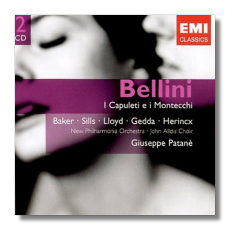
The Internet's Premier Classical Music Source
Related Links
- Bellini Reviews
- Latest Reviews
- More Reviews
-
By Composer
-
Collections
DVD & Blu-ray
Books
Concert Reviews
Articles/Interviews
Software
Audio
Search Amazon
Recommended Links
Site News
 CD Review
CD Review
Vincenzo Bellini

I Capuleti e i Montecchi
- Beverly Sills (Giulietta)
- Janet Baker (Romeo)
- Robert Lloyd (Capellio)
- Nicolai Gedda (Tebaldo)
- Raimund Herincx (Lorenzo)
John Alldis Choir
New Philharmonia Orchestra/Giuseppe Patanè
EMI Classics 5 86055-2 ADD 2CDs 60:42, 74:23
I have to confess that even though I like and listen to a lot of opera, I have my reservations about Vincenzo Bellini. Parts of Norma, I Puritani, La Sonnambula, and Il Pirata are nice, but I find it difficult to get too worked about those operas on the whole, even when a singer such as Maria Callas is singing them. So what is it about I Capuleti e i Montecchi that has grabbed me? Bellini and his librettist Felice Romani certainly didn't concern themselves with remaining faithful to Shakespeare's play. Here, the Capulets and Montagues are at outright war with each other, Juliet loves Roméo before the curtain even goes up, there is no Paris or Mercutio, Laurence is not a friar but a physician, and the lovers are both alive and conscious in the final scene, allowing them to sing a duet before dying.
What makes this opera difficult to palate for some is the fact that Roméo is sung not by a tenor but by a mezzo-soprano. (In 1966, conductor Claudio Abbado came up with a version of the opera that gave the role to a tenor, but it is quite clear that this was not Bellini's intention, and this idea seems not to have caught on.) Now Janet Baker has convincingly portrayed male characters on stage and on disc, but there's no getting around the fact that she sounds like a woman, and her duets with Sills need to be approached with that in mind. (It's probably sounds better on disc than it looks on stage.)
There have been a few studio recordings of this opera since 1975, when this one was recorded. What makes this one special is the presence of three very popular and capable singers – Baker, Sills, and Gedda – and the fact that the price is highly competitive. As part of EMI Classics' "Gemini" series, this pair of CDs will cost you less than the price of a single full-priced disc. There are no texts and translations, but you can download them at the EMI Classics website. (I checked, they're really there.)
Baker, of course, was famous for singing nearly everything within her range. Her contributions to the bel canto repertoire sometimes are forgotten, and this recording is good example of why they shouldn't be. In Romeo's opening scene she even rivals Marilyn Horne on one of her early recordings. Later, in the love duet with Sills, and in the last scene, she is poignant and mostly in glorious voice. Sills was getting close to the end of her career in 1975, but here she's at her very best, and she generates a lot of electricity with her high notes and her negotiation of Bellini's florid writing. She as well is terribly moving, making us feel Juliet's predicament in our hearts. Gedda, also nearing the end of his career, seems to enjoy the opportunity to play a bad guy, for a change, and he adopts the martial tones appropriate for Tybalt. His saber-rattling duet with Roméo is a highlight of this recording. Henrincx is a sympathetic Laurence, and Lloyd sings sonorously as Cappelio (Capulet). Patanè conducts the whole thing with verve, and the engineering has the mid-1970s bluster without the dodgy vinyl surfaces of that era.
Most highly recommended!
Copyright © 2005, Raymond Tuttle




















